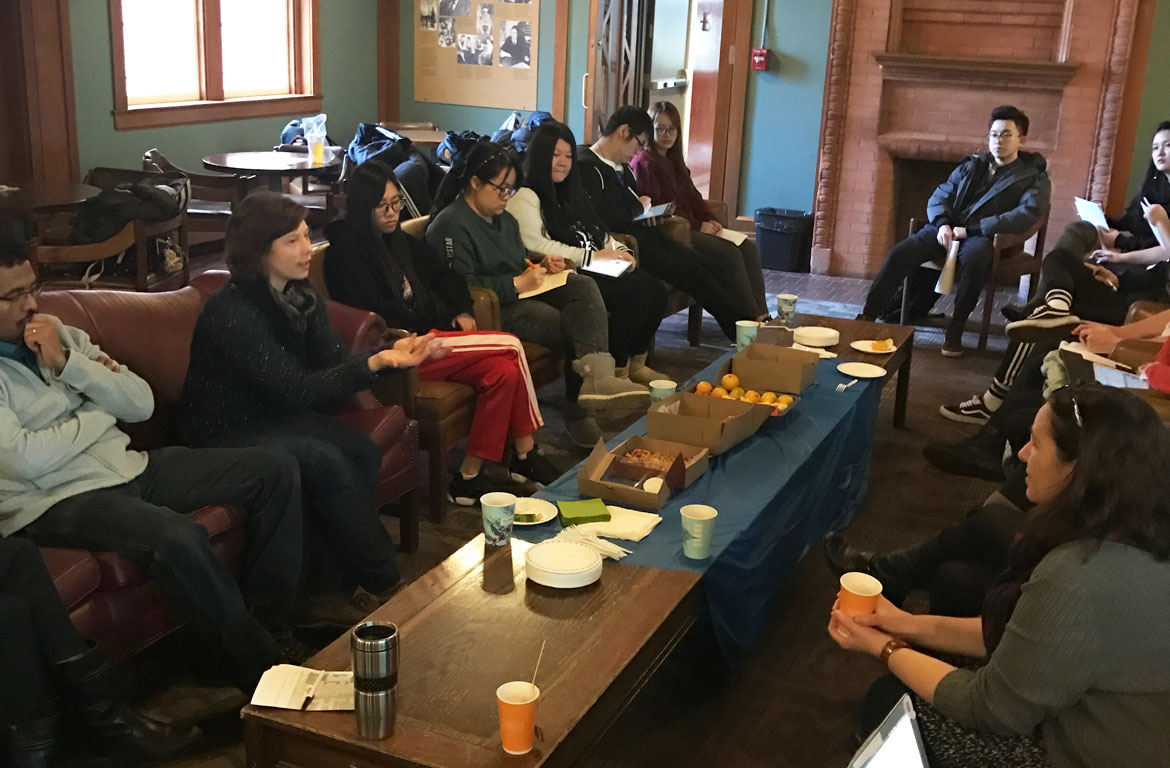
Bridging Program/English 102 forum
A new partnership between the Faculty of Arts' Community Service-Learning (CSL) program and the Canada-China Friendship Society is giving international students enrolled in the ESL Bridging Program/English 102 a glimpse into the Chinese diaspora in Canada.
Students who have recently arrived from mainland China and other countries are often unaware of the long history of immigration to Canada. With a thriving Chinese community in Edmonton, this partnership opens up new opportunities for students to learn about this history, and also, to build mutually beneficial partnerships between the University of Alberta and the local Chinese-Canadian community.
At its core, the course, which was developed through the Faculty of Extension and the Department of English and Film Studies, offers an introduction to literature for students who are new to the English language, introducing them to important concepts and approaches to the reading, writing and analysis of literary texts. Under the guidance of instructor Leilei Chen ('10 PhD), however, it has become much more.
"These students are different from native English speakers," she says. "I was thinking of new pedagogical ways of teaching them, and also, building bridges with the university and community partners." Through a series of outreach events designed by Chen and CSL DirectorDavid Peacock, students learned first-hand about the diversity of immigrant experiences directly from community members.
The first event in the fall of 2017 focused on teaching the idea of cultural identity, and how it evolves and shifts as populations move around the world. Five guest speakers presented oral autobiographical accounts of their lives from a diversity of perspectives in gender, age and occupation, which Chen says challenged students to find opportunities to share their own cultural knowledge.
"We wanted a way to position students according to their cultural strengths with the local communities, not their weaknesses around their English skills," says Peacock.
Since the course's inception in 2011, Chen had been looking for a way to deepen the students' critical thinking and writing skills by inviting them to reflect on their own experiences as newcomers, in juxtaposition with individuals of Chinese descent whose roots in this country span, in some cases, two centuries.
"When we think of 'the Chinese' as a racial category, it's problematic in the sense that it overlooks the diversity," she says. "So all these complicated migration stories that the speakers share really give students a good sense of what it means by being 'a Chinese.' They learned about the nuances under this umbrella."
One of the speakers, Philip Leung ('96 BA), Vice-President of the Canada-China Friendship Society of Edmonton, is a third generation Chinese-Canadian. His grandparents helped construct theCanadian Pacific Railroad in the latter part of the 19th century, a national venture that saw as many as 15,000 Chinese labourers working in harsh conditions for little pay. Historians estimate that at least 600 died during the construction.
"He had lots of things to say about the previous generations of Chinese living in Canada, and the racial discrimination they encountered," says Chen. She adds that the students were fascinated by his stories and the way generations of immigrants had come to love the country, while at the same time, were able to honour their own culture. Like so many immigrant experiences, Leung's stories, and those of the other speakers, touched on the complexities of cultural identity, belonging and in many cases, racism.
"Again, by using this opportunity, I'm trying to teach history as a social and cultural construct that benefits certain groups," she says. "After the talk, we discussed to what extent is history fictional, and also about the racial and social inequality. It relates to the novel we studied, Disappearing Moon Café [by Sky Lee]. It's a complicated novel, but listening to Philip Leung talking about real stories in Canada gives a sense of its historical background. It's all connected and it works really well."
Peacock is optimistic about the growth of such partnerships that would see international students increase their engagement with their studies while building new links to the Edmonton community. "The socio-cultural work that Leilei is doing is not just about language," he says. "It is part of the internationalization of higher education that is connecting the local and the global in a really interesting way. It's not just about English. It's about all of it."

Leilei Chen, instructor
Experiential Learning encourages Faculty of Arts students to reach beyond the classroom and create their own paths through structured opportunities such as research, community service, work, entrepreneurship and studying abroad. Learn more about experiential learning here.